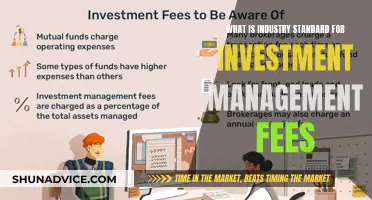
When you work with an investment advisor, you're entrusting them with a significant part of your future. It is important to carefully vet any financial professional before you work with them. Unlicensed individuals selling unregistered investments commit much of the investment fraud in the United States. Legitimate investment professionals must be licensed with FINRA, the Securities and Exchange Commission (SEC) or your state securities or insurance regulator before they can sell you anything. You can use the BrokerCheck feature on FINRA’s website to see if there are any complaints on file. If the answer is the SEC, you can use the SEC Investment Advisor search feature on the SEC's website to check out both the advisor and the firm they work for. You should also look for professional certifications and designations after an advisor's name, such as CFA, CFP, or CIMA.
| Characteristics | Values |
|---|---|
| Professional certifications | CFA, CFP, CIMA, CFS, CIC |
| Fee structure | Fee-only, commission-based, or based on assets managed |
| Transparency | Clear on how much you are paying for their services |
| Expertise, training, and education | Number of advanced degrees |
| Stability | Committed to the same organization for a long time |
| Communication | Regular communication about new developments |
| Recommendations | Able and willing to explain recommendations |
| Fiduciary | Legally required to put your interests first |
| Third-party custodian | Custodian services to guard against fraud |
What You'll Learn

Check their qualifications and disciplinary history
Checking an advisor's qualifications and disciplinary history is a crucial step in ensuring they are legitimate and trustworthy. Here are some detailed steps to guide you through this process:
Firstly, look for professional certifications and designations after an advisor's name. Notable financial certifications include the Chartered Financial Analyst (CFA), Certified Financial Planner (CFP), Certified Fund Specialist (CFS), and Chartered Investment Counselor (CIC). These certifications provide a level of assurance that the advisor has the necessary expertise and knowledge to provide sound financial advice.
Next, it is important to verify the advisor's background and disciplinary history. You can do this by utilising the Financial Industry Regulatory Authority's (FINRA) website and tools. FINRA is a regulatory body that oversees financial advisors, and their website offers a BrokerCheck service. This service allows you to search for individual advisors and view their summary report, which includes information on their qualifications, employment history, and any disclosure events. Additionally, you can find detailed reports on the advisor, providing further transparency.
Another resource to utilise is the Securities and Exchange Commission (SEC). The SEC is the main regulatory body for the securities industry, and they offer an Investment Adviser Public Disclosure (IAPD) website. Here, you can find information on individual advisors, including their registration status, business practices, fees, and disciplinary history. The IAPD website also provides access to Form ADV, which is the investment adviser registration form, containing valuable information about the advisor's background.
Furthermore, don't hesitate to contact your state securities regulator for additional information. Each state has its own securities regulator, and they can provide insights beyond what is available on FINRA BrokerCheck or the IAPD website. They can offer details on any disciplinary actions, customer disputes, or regulatory events involving the advisor.
By diligently checking an advisor's qualifications and disciplinary history through these resources, you can gain confidence in their legitimacy and make a well-informed decision about entrusting them with your finances.
College Savings vs Investments: Where Should Your Money Go?
You may want to see also

Ask about their values and long-term goals
When it comes to finding a legitimate investment advisor, it's crucial to ask about their values and long-term goals. This allows you to understand their principles and ensure they align with your own. Here are some ways to approach this important discussion:
First and foremost, ask open-ended questions about their core values. A legitimate advisor should be transparent and able to articulate their values clearly. For instance, they may prioritize client education, long-term relationships, or a commitment to ethical practices. If they struggle to communicate their values, it could be a red flag.
Next, inquire about their long-term goals, both for themselves and their clients. A trustworthy advisor should be focused on building long-term relationships and helping clients achieve their financial aspirations. Be cautious of advisors who seem more interested in short-term gains or pushing specific products that may not align with your interests. A good advisor will tailor their strategies to your unique needs and circumstances.
During your conversations, pay attention to how they talk about their previous clients and their success stories. A legitimate advisor should respect client confidentiality but also be able to provide general examples of how they've helped others. Ask about the types of clients they typically work with and the strategies they've employed to help them succeed.
Also, be sure to ask about their approach to risk management. A legitimate advisor should be transparent about the risks involved in any investment strategy and how they plan to mitigate those risks. They should be able to explain complex concepts in a way that's easy for you to understand, ensuring you're comfortable with the level of risk being taken.
Finally, discuss their views on staying up-to-date with industry developments and continuing education. A legitimate advisor should be committed to ongoing learning and adapting their strategies as the market evolves. They should be able to explain how they stay informed about new regulations, products, and trends, ensuring they provide the best advice possible.
Remember, a legitimate investment advisor should be focused on more than just financial gains. They should demonstrate a genuine interest in your long-term goals, values, and financial education, fostering a relationship built on trust and shared principles.
North Carolina: Investing in India's Future
You may want to see also

Understand their fee structure
Understanding the fee structure of an investment advisor is crucial to ensure you are getting value for money and to avoid excessive fees that can erode your financial returns. Here are some common fee structures used by investment advisors:
Percentage of Assets Under Management (AUM)
This is a common fee structure where the advisor charges a percentage of the total assets they manage for you. The percentage typically ranges from 0.25% to 2% per year, with an average of 1%. For example, if an advisor manages $1,000,000 for you and charges a 1.2% fee, you would pay $12,000 annually. This model incentivizes the advisor to grow your portfolio as their earnings increase with the size of your assets.
Flat Fee
Some advisors charge a flat rate for their services, usually ranging from $1,000 to $3,000 or more, depending on the complexity of your financial situation and the services required. This structure is often used by financial planners who provide advice and a financial plan that you execute yourself. It may be appealing if you want financial planning advice without tying the cost to your investment amount.
Hourly Rate
Some advisors charge by the hour, similar to lawyers. Hourly rates typically range from $120 to $400 per hour. This structure is suitable if you only need occasional advice or specific questions answered rather than ongoing portfolio management.
Performance-Based or Commission Fees
Some advisors may charge commissions on the investment products they sell, which are paid by the client within the product itself or as early exit fees. Others may charge a performance-based fee, where an additional fee is assessed if their service outperforms a specified benchmark. These fee structures can incentivize advisors to generate commissions or focus on short-term gains rather than your long-term financial interests.
Annual Retainer
Some advisors charge a set annual fee, typically ranging from $6,000 to $10,000, to provide financial assistance as needed throughout the year. This structure is often used by advisors offering comprehensive financial planning services, including tax and estate planning.
Hybrid Models
Some advisors combine different fee structures, such as charging an AUM fee plus commissions or an hourly rate for additional services.
When evaluating an investment advisor, it is essential to understand their fee structure and what services are included. Ask questions such as: "What is the total cost for working with you over the next year, and what will I receive in return?" and "How do you add value for any fees charged above standard rates?".
Additionally, consider your specific needs and budget. If you have a simple financial situation or are just starting out, a flat fee or hourly rate might be more cost-effective. In contrast, if you have a high net worth and require continuous portfolio management, an AUM-based fee may be more suitable.
Remember, the cheapest option is not always the best, and it is essential to consider the level of service and expertise provided.
Investing in Equipment: A Smart Move to Boost Equity
You may want to see also

Verify their registration status
An important step in ensuring your investment advisor is legitimate is to verify their registration status. Unlicensed, unregistered individuals commit a lot of investment fraud in the United States. You can use the free search tool on Investor.gov to check your investment professional's registration status. This will direct you to the SEC's Investment Adviser Public Disclosure (IAPD) website. You can also visit the IAPD website directly, FINRA's BrokerCheck program, or your state securities regulator. Both the IAPD and BrokerCheck databases will automatically redirect you to the other if necessary. These searches are free and your investment professionals or firms will not be made aware of them.
The IAPD website is for SEC or state-registered investment advisors or the individuals who work for them. Here, you can find registration status and background information such as the adviser's business practices, fees, conflicts of interest, and disciplinary history.
FINRA's BrokerCheck program is for individual brokers or brokerage firms. Here, you can find registration status and background information for individual brokers, including industry exams passed, previous employment, customer disputes, and regulatory or disciplinary events. You can also find background information on brokerage firms, such as history (including any mergers, acquisitions, or name changes), licenses and registrations, arbitration awards, and regulatory or disciplinary events.
Your state securities regulator may have additional information beyond what's on BrokerCheck or IAPD. You can call the North American Securities Administrators Association (NASAA) or visit their website for information on how to contact your state regulator.
It is also important to check that the investments themselves are registered. Not all securities offerings must be registered with the SEC—such as those issued by municipal, state, and federal governments. The SEC also provides exemptions for certain intrastate offerings and small public and private offerings under Regulation D. You can check whether a mutual fund is registered with the SEC by visiting the SEC's EDGAR Mutual Fund Search. If you find the mutual fund there, then it is registered with the SEC.
Investing Young: Better Than Saving?
You may want to see also

Ask for referrals and run a background check
When it comes to choosing a financial advisor, it's crucial to be diligent and thorough in your research. One essential step is to ask for referrals and run a background check. Here's a detailed guide on how to navigate this process effectively:
Ask for Referrals:
Start by asking your prospective financial advisor for a list of referrals or references. A reputable advisor should be comfortable providing you with contact information for some of their current or former clients. These clients can offer valuable insights into the advisor's work ethic, communication style, and overall satisfaction with their services. It's important to note that referrals can provide a certain degree of comfort and confidence in the advisor's abilities and trustworthiness.
Run a Background Check:
Performing a comprehensive background check on your potential financial advisor is of utmost importance. This process will help you verify their credentials, qualifications, and any disciplinary history. Here are some key steps to follow:
- Utilize FINRA BrokerCheck: The Financial Industry Regulatory Authority (FINRA) offers a free service called BrokerCheck. You can search for your advisor on this platform to access information about their employment history, qualifications, disclosure events, and more. This tool provides transparency and helps you identify any potential red flags.
- Contact State Securities Regulators: In addition to FINRA, each state has its own securities regulator. Reach out to your state securities regulator to inquire about your advisor. They may have additional information or insights that complement what you find on BrokerCheck.
- Review Disciplinary History: When conducting your background check, pay close attention to any disciplinary or regulatory events associated with the advisor. This includes investigations, customer disputes, or non-compliance with regulations such as the Employee Retirement Income Security Act (ERISA). Such issues could indicate potential ethical concerns or a history of misconduct.
- Verify Qualifications: Ensure that your financial advisor has the necessary qualifications and certifications. Look for designations such as CFA (Chartered Financial Analyst), CFP (Certified Financial Planner), CFS (Certified Fund Specialist), or CIC (Chartered Investment Counselor). These certifications demonstrate a strong foundation of knowledge and expertise in the field.
- Check for Stability: Consider the advisor's commitment to their profession and organization. Look for advisors who have established a long-term presence in the industry and have demonstrated stability in their career. This indicates a level of dedication and consistency in serving their clients.
By asking for referrals and conducting a thorough background check, you can significantly increase your chances of finding a legitimate and trustworthy financial advisor. Remember, trust is paramount when it comes to financial matters, so taking these steps will help protect your financial well-being.
Structuring Private Equity Investment Thesis: A Comprehensive Guide
You may want to see also
Frequently asked questions
You can use the free search tool available on Investor.gov, which will direct you to the SEC’s Investment Adviser Public Disclosure (IAPD) website. You can also visit the IAPD website directly, FINRA’s BrokerCheck program, and/or your state securities regulator.
You can find registration status, background information such as the adviser's business practices, fees, conflicts of interest, and disciplinary history.
You can find background information for individual brokers such as industry exams passed, previous employment, customer disputes, and regulatory or disciplinary events. You can also find background information on brokerage firms such as history, licenses and registrations, arbitration awards, and regulatory or disciplinary events.
You may find additional information beyond what is on BrokerCheck or IAPD.
You can ask the advisor questions about their core values, how they are compensated, and their level of expertise. You can also ask for referrals and run a background check on them.







